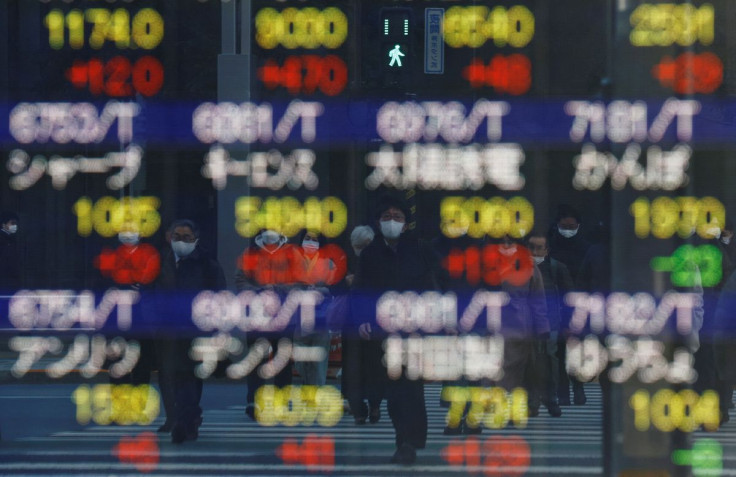World Stocks Kick Off August At 7-wk High, U.S. Futures On Back Foot

World stocks hit seven-week highs on Monday, buoyed by recent strong corporate earnings and declining expectations for hefty interest rate rises, though U.S. index futures were indicating a lower start to August at the Wall Street open.
Over the past month, global shares have gained 7%, the S&P 500 jumped 9% and bond markets rallied as investors started to look for a peak in official interest rates, given slowing economic growth.
Markets have gathered steam after comments on the economy from Federal Reserve chair Jerome Powell last week following a 75-basis-point hike in interest rates by the Fed.
"There's a sense of relief that the Fed have at least got an eye on slowing growth. They are not going to be pig-headed and keep hiking interest rates as the economy falls into deep dark recession," said Giles Coghlan, chief currency analyst at HYCM.
In addition, upbeat forecasts from Apple and Amazon on Friday pushed the S&P 500 and the Nasdaq index to their biggest monthly percentage gains since 2020.
MSCI's world equity index rose 0.3%. S&P futures dipped 0.15%, however, indicating a lower open on Wall Street, after the index rose 1.42% on Friday, also to seven-week highs.
The U.S. ISM manufacturing survey for July is due at 1400 GMT, forecast to give an expansionary reading of 52, according to a Reuters poll. Key U.S. employment data is due on Friday.
"The US is not in a 'proper recession' - yet," Gilles Moec, Group Chief Economist at AXA Investment Managers, said in a note.
"The labour market is key there, and the Fed will want to see clear signs of deceleration in wages before lowering its guard."
Manufacturing activity across the euro zone contracted last month with factories forced to stockpile unsold goods due to weak demand, a survey showed on Monday.
Central banks in Britain, Australia and India are all expected to hike again this week.
European stocks gained 0.32% and Britain's FTSE was up 0.56%, boosted by strong results from HSBC.
MSCI's broadest index of Asia-Pacific shares outside Japan rose 0.27% but stayed within recent ranges.
China's official measure of factory activity contracted in July as fresh virus flare-ups weighed on demand, and the Caixin PMI also missed forecasts.
Chinese blue chips hit six-week lows before recovering ground to trade 0.45% higher. Japan's Nikkei added 0.7%.
Speculators bet on the dollar against the yen on rate hike expectations and have found themselves squeezed out by the sudden turnaround. The dollar hit six-week lows against the yen and was down 0.67% at 132.335 yen.
The dollar fared a little better on the euro, which has a European energy crisis to contend with, and made hardly any headway last week. The euro was last up 0.23% at $1.0243.
The dollar fell 0.44% to its lowest in nearly four weeks on a basket of currencies,
Bond markets have also been rallying hard, with U.S. 10-year yields falling 35 basis points last month in the biggest decline since the start of the pandemic. Yields were last at 2.6523%, after hitting their lowest in nearly four months at 2.6180% on Friday.
The yield curve remains sharply inverted, suggesting bond investors are more pessimistic on the economy than their equity brethren. [US/]
Italy's 10-year government bond yield hit two-month lows of 3.023% after prime ministerial front-runner Giorgia Meloni said last week she would stick to EU budget rules, easing some fears that Italy could distance itself from the bloc. [GVD/EUR]
Oil prices dropped as weak manufacturing data from China and Japan weighed on the outlook for demand, while investors braced for this week's meeting of officials from OPEC and other top producers on supply adjustments. [O/R]
U.S. crude fell $1.89 to $96.74 per barrel, while Brent fell $1.53 to $102.45.
Chicago wheat and corn fell as the first grains ship left a Ukrainian port using the newly agreed safe shipping channel, raising hopes Ukraine's sea-borne cereals exports can resume on a large scale after being blocked by war.
Gold rose 0.4% to $1,765 an ounce as the dollar softened, after bouncing 2.2% last week. [GOL/]
© Copyright Thomson Reuters 2024. All rights reserved.











